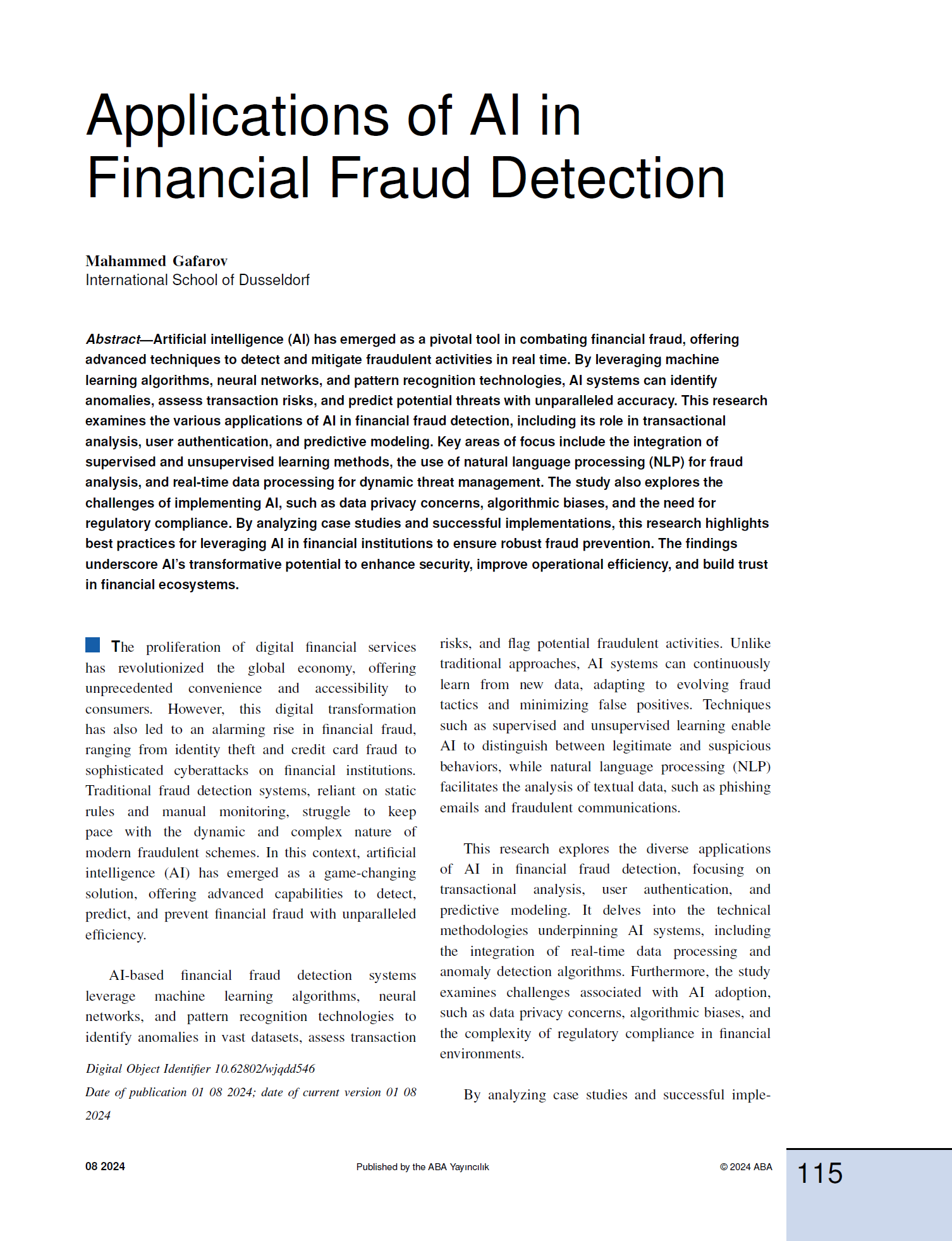Applications of AI in Financial Fraud Detection
DOI:
https://doi.org/10.62802/b5ag6938Keywords:
Financial fraud detection, artificial intelligence, machine learning, pattern recognition, predictive modeling, supervised learning, unsupervised learning, natural language processing, real-time analysis, data privacyAbstract
Artificial intelligence (AI) has emerged as a pivotal tool in combating financial fraud, offering advanced techniques to detect and mitigate fraudulent activities in real time. By leveraging machine learning algorithms, neural networks, and pattern recognition technologies, AI systems can identify anomalies, assess transaction risks, and predict potential threats with unparalleled accuracy. This research examines the various applications of AI in financial fraud detection, including its role in transactional analysis, user authentication, and predictive modeling. Key areas of focus include the integration of supervised and unsupervised learning methods, the use of natural language processing (NLP) for fraud analysis, and real-time data processing for dynamic threat management. The study also explores the challenges of implementing AI, such as data privacy concerns, algorithmic biases, and the need for regulatory compliance. By analyzing case studies and successful implementations, this research highlights best practices for leveraging AI in financial institutions to ensure robust fraud prevention. The findings underscore AI's transformative potential to enhance security, improve operational efficiency, and build trust in financial ecosystems.
References
Balaji, K. (2024). Harnessing AI for Financial Innovations: Pioneering the Future of Financial Services. In Modern Management Science Practices in the Age of AI (pp. 91-122). IGI Global.
Bello, O. A., & Olufemi, K. (2024). Artificial intelligence in fraud prevention: Exploring techniques and applications challenges and opportunities. Computer Science & IT Research Journal, 5(6), 1505-1520.
Dayalan, P., & Sundaramurthy, B. (2025). Exploring the Implementation and Challenges of AI-Based Fraud Detection Systems in Financial Institutions: A Review. Creating AI Synergy Through Business Technology Transformation, 25-38.
Husnain, A., Qayyum, M. U., Fahad, M., & Ibrar, M. (2024). Integrating AI in Healthcare: Advancements in Petroleum Fraud Detection and Innovations in Herbal Medicine for Enhanced Cancer Treatment Approaches. International Journal of Multidisciplinary Sciences and Arts, 3(4), 77-86.
Ibrar, M., Fahad, M., Qayyum, M. U., & Husnain, A. (2024). Leveraging AI in Healthcare: Insights from Petroleum Industry Practices and Fraud Detection Strategies with ChatGPT Applications. JURIHUM: Jurnal Inovasi dan Humaniora, 2(2), 244-256.
Lin, A. K. (2024). The AI Revolution in Financial Services: Emerging Methods for Fraud Detection and Prevention. Jurnal Galaksi, 1(1), 43-51.
Papasavva, A., Johnson, S., Lowther, E., Lundrigan, S., Mariconti, E., Markovska, A., & Tuptuk, N. (2024). Application of AI-based Models for Online Fraud Detection and Analysis. arXiv preprint arXiv:2409.19022.
Shoetan, P. O., & Familoni, B. T. (2024). Transforming fintech fraud detection with advanced artificial intelligence algorithms. Finance & Accounting Research Journal, 6(4), 602-625.
Singh, S., Mohan, R., Deshpande, A., Nukala, S., Dwadasi, V. S. A., & Jilani, S. (2024). Artificial intelligence and machine learning in financial services: risk management and fraud detection. Journal of Electrical Systems, 20(6s), 1418-1424.
Xu, J., Yang, T., Zhuang, S., Li, H., & Lu, W. (2024). AI-based financial transaction monitoring and fraud prevention with behaviour prediction.









